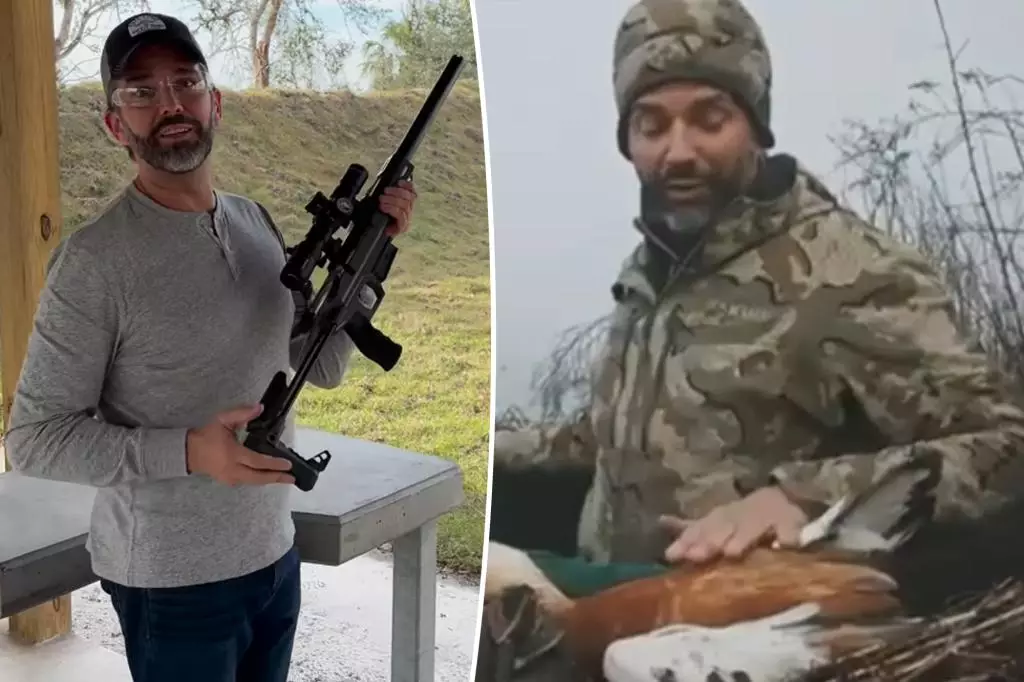Donald Trump Jr. has become a focal point of international controversy following a duck hunting expedition in Italy. The episode has not only drawn ire from animal rights activists and local politicians but raises broader questions about conservation, hunting ethics, and adherence to regulations by foreigners in foreign lands. The incident spotlights the delicate balance between human recreational pursuits and wildlife conservation, especially in regions where certain species are at risk.
The uproar began when a hunting video emerged, reportedly featuring Trump Jr. donning camouflage and participating in a hunt near Venice. The footage allegedly included the taking of a rare duck species, which has intensified backlash from environmental activists and led local politicians to demand an inquiry. Critics have labeled the hunt as reckless, suggesting it reflects a blatant disregard for local wildlife laws. With a notable duck, potentially identified as a Ruddy Shelduck, being highlighted, questions arose about whether all involved followed appropriate guidelines.
Supporting Trump Jr.’s case, his representative, Andy Surabian, insists that all necessary permits were obtained and that the hunting took place in a legally sanctioned area. Surabian emphasized that the “bird bruhaha” was overstated, claiming that there was no definitive evidence linking Trump Jr. directly to the unfortunate killing of the rare duck. He maintained that they were committed to cooperating with any inquiries, reiterating the importance of adhering to wildlife conservation laws during hunting activities.
Italian political figures have been vocally critical of Trump Jr.’s actions, citing national laws that govern hunting practices. Andrea Zanoni, a politician affiliated with the Green party, emphasized that non-residents in Italy are generally prohibited from hunting unless they possess a specific local permit. This critical perspective underlines a larger concern about foreign nationals’ engagement with Italy’s wildlife and the legal ramifications that may ensue.
The call for prosecutorial action by local politicians, including a request directed to the Environment Minister, suggests that the implications of this incident extend beyond Trump Jr. personally; it challenges the very framework of wildlife conservation in Italy, especially in relation to outsider interactions with rare species. The contention raises critical points about legal frameworks governing hunting and the responsibilities of international hunters regarding local ecosystems.
This incident serves as a reminder of the ethical implications surrounding hunting practices, especially regarding endangered or vulnerable species. While hunting can be a regulated and sustainable practice in certain contexts, lapses in adherence to local laws can not only endanger wildlife but also undermine conservation efforts. Critics of the hunting culture argue that instances like this highlight a troubling disconnect between sportsmanship and ecological responsibility.
Further complicating this issue is the growing visibility of hunting, particularly among celebrity figures like Trump Jr., whose actions might lead to normalizing contentious practices. The interplay between celebrity influence and ethical hunting practices raises concerns about broader societal attitudes toward wildlife and conservation, especially among younger audiences who may idolize such figures.
Historically, this is not Trump Jr.’s first brush with hunting-related controversy. Past incidents, such as purportedly hunting an endangered species of sheep in Mongolia, have formed a troubling narrative surrounding his hunting exploits. Each occurrence invites scrutiny not just of his actions, but of the hunting community at large and its ethical considerations. The pattern of engagement with rare species notwithstanding, it fuels ongoing debates about the responsibilities of individuals traveling overseas and participating in activities that impact local wildlife.
While Trump Jr. may hope to quash this controversy, the incident encapsulates a broader discourse on hunting, conservation, and ethical guidelines that dictate both recreational activities and wildlife protections. As more individuals engage in global hunting practices, addressing these dilemmas becomes crucial for maintaining balance with nature.
The fallout from this hunting trip serves as a stark illustration of the need for ongoing dialogue surrounding hunting ethics, local laws, and conservation responsibilities. Whether it culminates in significant regulatory changes, prosecution, or simply remains a blip on the radar remains to be seen, but it undoubtedly raises essential questions about who gets to hunt, where, and under what circumstances.

